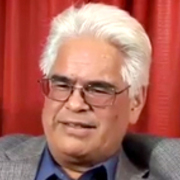
Ray Waru
Ray Waru joined Television New Zealand in 1977 and spent a decade involved in programme-making, ranging from longstayers Country Calendar and Fair Go to religious show People Like Us and Tomorrow's World, a co-production with the BBC.
In 1980, Waru established the first Māori television production unit at Television New Zealand, based in Auckland. There he produced Koha, the first regular Māori programme to be shown in primetime.
The 30 minute programme provided a weekly opportunity for Māori to tell their stories, and also gain experience in the industry. Behind the scenes there was much discussion over what language should be spoken on air, and who was the primary audience. Initially broadcast in English, Koha began to use more Māori over time.
Waru directed Koha's coverage of the milestone Te Māori exhibition of Māori art which toured the United States in 1984, including episodes Te Māori, A Cloak of Words and Te Māori - Te Hokinga Mai.
Among the wide range of Māori programming Waru has directed is the first ever 100 per cent Māori language drama production, Te Ōhākī a Nihe (which screened on Koha) and another series, Titiro Mai, between 1980 and 1985.
Over the years, Waru has produced or directed a wide range of documentary films and series for TVNZ and TV3, with a particular focus on Māori, heritage and historical programming. Among the documentary series he has produced or directed are The Natural World of the Māori and the awardwinning Our People, Our Century. He was also involved in an IMAX project for the East/West Centre in Hawaii.
In 1989, Waru was appointed chief executive of the Aotearoa Māori Radio Trust, which established a Māori radio network based in Auckland, Wellington and Christchurch. The network became the basis for the iwi radio network, and provided a model of Māori management of broadcasting services aimed at Māori — the forerunner to Māori Television.
Waru produced two 13-part serials to complement Te Whanake, a series of textbooks and resources for learning Māori. Te Kākano was designed for beginner and intermediate learners, while Te Kai a Te Rangatira catered to intermediate and more advanced learners.
In 2000, Waru co-produced six-part documentary series Our People, Our Century, with David Harry Baldock. Waru described it as "my first real experience of doing proper history on television". In this ScreenTalk interview, he argues that the show "used the best historians in the country to basically reach out beyond the university to try and popularise New Zealand history, without doing damage to the content". One of the country's biggest documentary productions to date, the series used recreations of key events, and stretched from Aotearoa's geological formation to the new millennium. It won Best Factual Series at the NZ Television Awards.
Between 2003 and 2005, Waru worked with producer Vincent Burke on a "hugely exciting" project with an even broader sweep: 13-parter Frontier of Dreams. He also directed some episodes. It won awards at the Houston International Film Festival and the US International Film and Video Festival. The show was conceived and produced by Whakapapa Productions, a joint venture between Burke's company Top Shelf Productions and Waru's Te Reo Television.
Burke praised Waru for what he saw as one of the key strengths of the series: a collegial approach by Māori and Pākehā writers. “He’s taken the essays by the directors and the historians and made them work on screen … They have a consistent graphic technique but each episode has a slightly different flavour, a different focus."
In 2007, Waru produced and directed A Perfect Hell: Kiwis on Gallipoli - the official New Zealand film shown at Gallipoli. The following year he helmed The Town New Zealand Saved, which screened on Anzac Day.
Other credits include Kiri Māori, The People Next Door, Radicals, Tomorrow's Soldiers, Toccatas and Taiahas, Women Talk about Breast Screening, Alan Duff: The Crisis and the Challenge, Beth's World, and A Hell of a Ride.
He has also produced corporate communication videos for a range of clients including the Ministry of Health, Ministry of Education and Auckland Museum.
Waru has been involved with The Peace Foundation through the Media Peace Awards, first as a judge and then as convenor for more than 15 years. He is currently a member of the New Zealand Peace Foundation Council and is a strong supporter of the foundation's outreach programmes such as 'Cool Schools'.
Apart from television production, Waru is involved in developing digital media projects, books and e-book formats, and feature film projects.
Sources include
'Ray Waru: Maori Broadcasting Pioneer' (Video Interview), NZ On Screen website. Director Andrew Whiteside. Uploaded 29 April 2013. Accessed 30 April 2013
Philip Wakefield, 'Dreams becomes a reality.' - Onfilm, September 2005
Te Whanake TV website. Accessed September 18 July 2014
'Frontier of Dreams.' TVNZ website. Accessed 18 July 2014
The Peace Foundation website. Accessed 18 July 2014